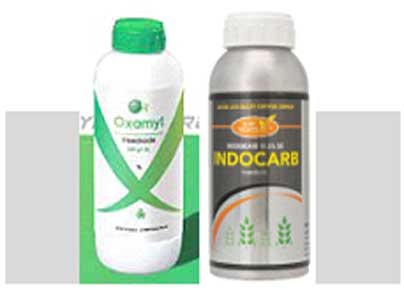Costa Rican Exporters to Seek More Eco-Friendly Pesticides
2024-05-24

According to the State Phytosanitary Service (SFE), the European Union (EU) has established new maximum residue limits (MRLs) for the pesticides Oxamyl and Indoxacarb, which are widely used in fruit and vegetable crops in Costa Rica. This restriction applies to products intended for export, so sector members indicated that they would seek environmentally friendly substitute products.
From May 11, the new MRL parameters for Oxamyl will range between 0.001 and 0.005 milligrams per kilogram (mg/kg), depending on the vegetable product. It currently stood between 0.01 and 0.05 mg/kg. In the case of Indoxacarb, starting on August 24, the new limit will be 0.01 mg/kg for all vegetables except blueberries, spices, and tea. According to the United Nations Food and Agriculture Organization (FAO), the MRL is the maximum level of pesticide residues legally allowed in fresh or dry foods (feeds), both inside and on their surface. This limit is established when pesticides are used correctly by good agricultural practices.
According to the World Health Organization (WHO), Oxamyl used as an insecticide and to control nematode pests, is classified as "extremely dangerous". In contrast, Indoxacarb is classified as "moderately dangerous" according to the hazard scale of pesticides recommended by the organisation.
In Costa Rica, the SFE catalogues Oxamyl as one of the 94 most toxic products (red band). It is considered "extremely dangerous" in 10 and "highly dangerous" in two of its commercial formulations.
Jorge Sauma, general manager of the National Banana Corporation (Corbana), expressed that the EU measure practically eliminates the use of Oxamyl in the country by establishing minimum limits, which forces the search for substitutes. The sector does not use Indoxacarb and considers it necessary to expedite procedures in the country to approve environmentally friendly molecules.
Victor Carvajal, head of the Ministry of Agriculture and Livestock (MAG), denied delays in registering new molecules. He assured that, at this moment, the records are coming out on time through homologation, and registration strictly responds to the business decisions of the distributors. Regarding generic products, he mentioned that they are preparing a regulation for their registration due to an action of unconstitutionality that currently prevents it.
The official indicated that eight Technical Grade Active Ingredients (TGAI) were registered in 2024, nine in 2023, and eight in 2022, compared to the 12 achieved between 2018 and 2021, according to SFE data.
Sauma mentioned that complying with limits as low as those established by the EU is almost impossible but considered that excluding red-band pesticides from green-band ones (which do not represent danger) is a move in the right direction. In Corbana, more than 70% of the research focuses on finding environmentally friendly substitutes.
The European Union is the primary market for Costa Rican bananas, with 55% of exports totalling $537 million in 2023, according to data from the Foreign Trade Promoter (Procomer). The fruit was ranked first in the placements of agricultural products to this market, followed by pineapple, coffee, cassava, ornamental plants, foliage, watermelons, melon, and ñampí.
Nelson Morera, director of the SFE, recommended that the producers and exporters of the items authorised for the EU respect the grace periods, which are the waiting period between the application of agrochemicals and the harvest period, and send the products within the new limits allowed for export. "We must be respectful if we want to export to Europe," he said.
Morera indicated that red band products are marketed in the country with a prescription issued by specialists. Regarding products for internal consumption, Morera referred to Costa Rica following the regulations of the FAO Codex Alimentarius, which, in most cases, establishes higher limits than those of the EU.
In April 2023, Germany issued a health alert for a shipment of melons from Costa Rica that contained residues of chlorothalonil above the limits allowed in the EU.
Jorge Cartín, director of the Alliance for Agricultural Sustainability (ASA), considered that these changes are a signal for producers seeking to enter the European market and urged them to learn about these modifications derived from the Green Pact.
The EU Green Pact aims for Europe to be the first climate-neutral zone by 2050 through policies aimed at climate, energy, transport, agriculture, and food to reduce greenhouse gas emissions by 2030.
The ASA comprises the National Chamber of Agriculture and Agribusiness (CNAA), the Association of Formulators and Marketers of Agrochemicals of Costa Rica (Asoagro), and the Chamber of Agricultural Inputs.
April 2024 saw the highest volume of banana sales, with 1,956.6 tons. Conversely, February had the fewest sales, with 1,427.6 tons. However, February experienced the most significant year-on-year increase in sales, with a growth of 44.0%.









